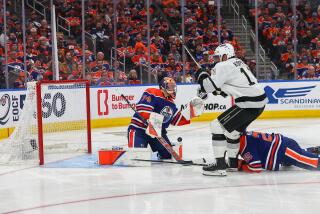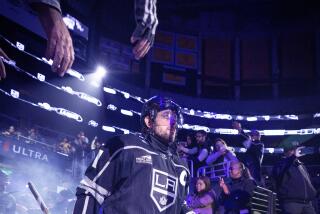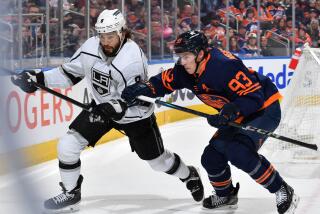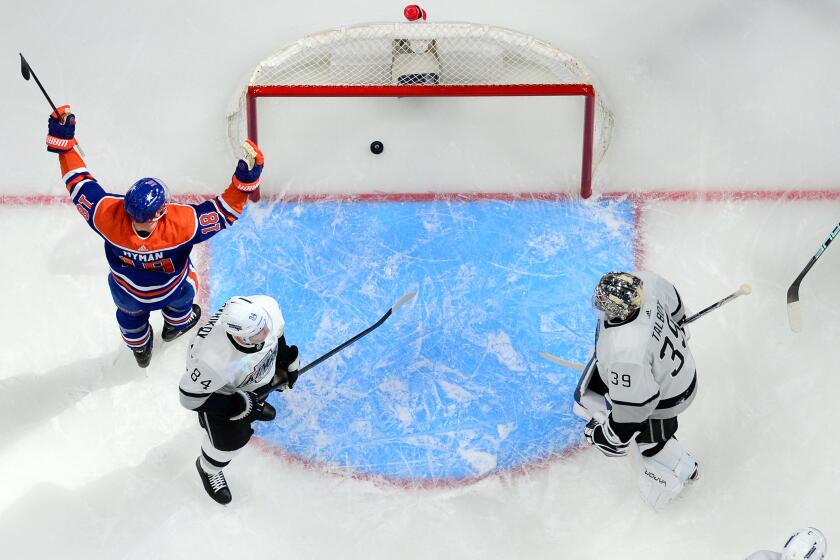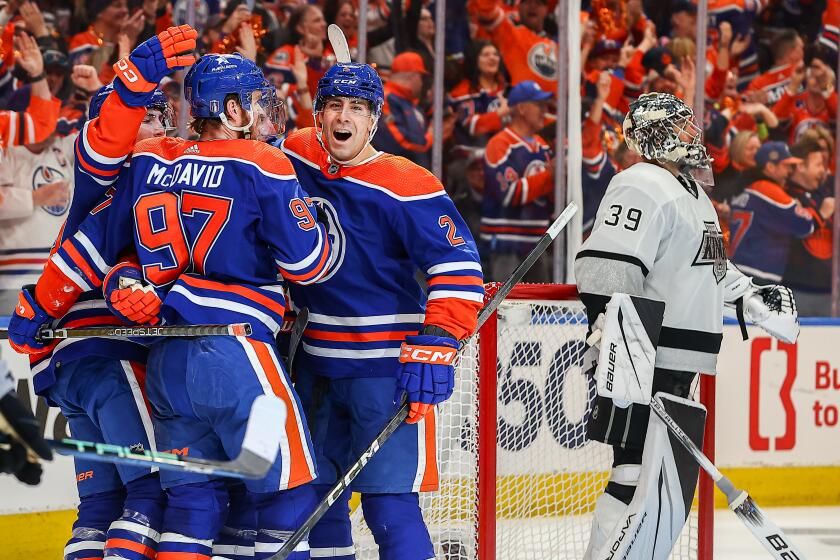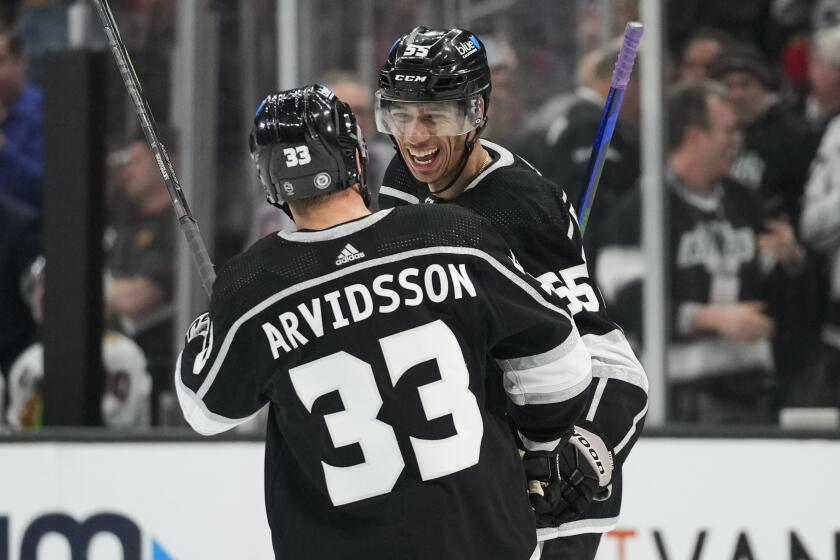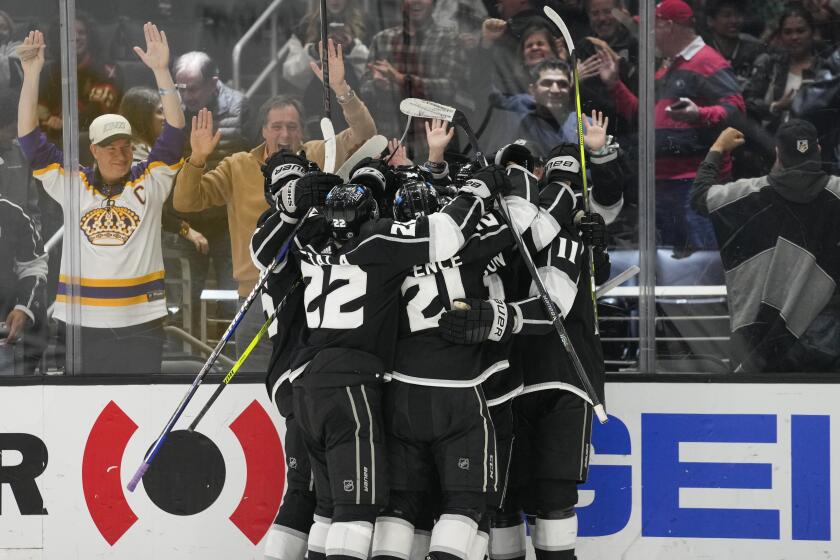Getting Fans Back Will Be a Tough Sell
Picking up the pieces will be the order of business for the Kings and Mighty Ducks, now that the NHL and NHL Players’ Assn. have come to terms. A lockout that lasted 301 days left plenty of problems that must be overcome as both teams will try to convince fans that losing a season was worth it.
“As players, we’ve got to get out there and make ourselves famous,” King center Sean Avery said Wednesday. “But we’ve got to win in L.A. The 15,000 fans we have, the fans that come to our games are amazing. We need to make it a tough sell. We need to make it so people can’t get tickets to come to our games.”
For now, plenty of tickets are available.
Hockey’s vanishing act seemed to produce mere ripples in Southern California. Its return may require a bigger splash than the marketing slogan, “It’s A Whole New Game,” dreamed up in the league office.
The area’s two teams must learn to function under a more restrictive collective bargaining agreement -- which is expected to be ratified next week -- while trying to lure fans back with rule changes and ticket price cuts.
But the NHL’s pursuit of cost certainty has been costly on the fan front.
“Hockey is back, but there is going to be a long battle for the league because the damage done is inconceivable,” said San Pedro’s Jon Hildebrand, a King season-ticket holder since 2001-02. “The hard-core fans will definitely be back, but the casual fans who are on the fence, something needs to be done to draw them back in.”
The Kings will try to lean heavily on nearly 40 years in the market. The Ducks are banking on new ownership, new management and, eventually, a new coach to bring back fans who spent their money on the area’s many other recreational distractions while the NHL and union bickered for 10 months.
Whether the sport will flourish, or even maintain its niche status, remains to be seen. But officials are optimistic.
“People will find hockey fans are more loyal than skeptics believe,” said Brian Burke, who was hired as the Ducks’ general manager on June 20. “Our core fans love this game and will regard this as a huge day. They can’t wait to get back in the building.”
Fans, even the hard-core ones, may have trouble forgiving.
“I can understand that both sides didn’t want to back down,” Hildebrand said. “It was a game of chicken. It just took too darn long. Yeah, I’m bitter, but don’t have animosity to one side or the other. It’s a combined animosity because neither side cared about the fans. They always said the fans were important, but in the next breath, they’d say we’re going to continue this lockout.”
The NHL will try to renew fan interest with rule changes designed to boost scoring, most notably the reduction of goaltender pads from inner-tube-like proportions and the addition of the shootout to settle scores that are tied.
Individual teams, meanwhile, will reach out with price cuts.
The Ducks had about 8,000 season-ticket holders during the 2003-04 season. By the time Commissioner Gary Bettman canceled the season Feb. 16, team officials said they had retained only 72% of those ticket holders, a drop of about 1,800 fans.
With new ownership -- Henry and Susan Samueli purchased the team from the Walt Disney Co. -- the Ducks may stand a better chance of reinvigorating a fan base that produced nightly sellouts when the team was new to the NHL. The Ducks have already announced a season-ticket price cut on 14,000 seats, although it amounts to slightly more than a 5% cut across the board.
“I think this is a proven hockey market,” Burke said. “I never looked at Anaheim as not being a hockey market. I always thought it supported hockey on a frantic level. Then [fans] lost faith.”
The Kings, a team spokesman said, will “announce plans for ticket pricing and fan initiatives when the deal is ratified.”
But the Kings were in better shape than the Ducks before the lockout, with about 12,000 season-ticket holders, of whom 91% had been retained when the season was canceled, team officials said.
“I think it will be easier here because of the resources we have,” Avery said. “ ... All American trends are funneled from [Los Angeles].”
But changes are required.
“First and foremost we need to lose the blue-collar mentality,” Avery said. “Hockey players are personable and have interesting things to say. No one has any idea about them.”
Avery said that even in Canada, the emphasis has been on “the game” and “never on the players.” He said that the league has to begin marketing individual players to appeal to fans.
“We have some amazing players,” Avery said. “[Atlanta’s] Dany Heatley, [Tampa Bay’s] Vinny Lecavalier. Figure it out, Vinny Lecavalier is the best-looking guy in sports.”
That star quality will still cost money, even under the CBA’s tighter payroll restrictions. Both teams made efforts to trim their on-ice payroll to prepare for the salary cap that Bettman pushed to get, between $21 million and $39 million.
The Kings were a bit more successful. After the 24% rollback on player salaries the new agreement calls for, the Kings project paying about $20 million to 20 players, those currently under contract and restricted free agents, leaving plenty of cap room to chase quality free agents. Defenseman Mattias Norstrom is the team’s highest-paid player at $3 million after the rollback.
The Ducks, meanwhile, have 22 players under contract for next season, but only eight have played in the NHL, including Steve Rucchin, Sergei Fedorov, Jean-Sebastien Giguere, Keith Carney and Petr Sykora. Even with the rollback, those eight players will cost the Ducks about $20 million.
Under the new system, a team can buy out a player’s contract by paying two-thirds of its value. But Burke is not expected to go that route.
More to Read
Go beyond the scoreboard
Get the latest on L.A.'s teams in the daily Sports Report newsletter.
You may occasionally receive promotional content from the Los Angeles Times.
